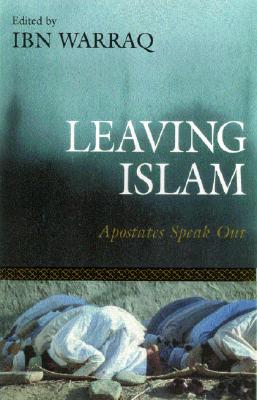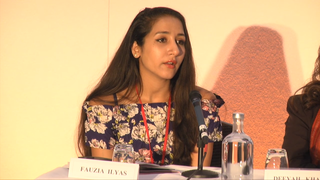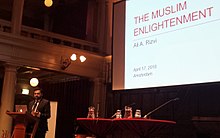Apostasy in Islam is commonly defined as the abandonment of Islam by a Muslim, in thought, word, or through deed. It includes not only explicit renunciations of the Islamic faith by converting to another religion or abandoning religion, but also blasphemy or heresy by those who consider themselves Muslims, through any action or utterance which implies unbelief, including those who deny a "fundamental tenet or creed" of Islam, An apostate from Islam is known as a murtadd (مرتدّ).

Leaving Islam: Apostates Speak Out is a 2003 book, authored and edited by ex-Muslim and secularist Ibn Warraq, that researches and documents cases of apostasy in Islam. It also contains a collection of essays by ex-Muslims recounting their own experience in leaving the Islamic religion.
Rizvi or Rizavi is the Urdu variant of the Arabic surname Ridhawi and the Persian surname Razavi. It is a Muslim surname commonly associated with the branch of Husaynids, who claim descent from the Imam Ali al-Ridha, a descendant of the Islamic prophet Muhammad through his grandsons, Husayn ibn Ali and Hasan ibn Ali. Their lineage also traces back to Muhammad and Abd ar-Rahman, the sons the prominent companion of the Islamic prophet, and the first Rashidun caliph, through his great-grandmother Umm Farwa. Since the Rizvi clan traces their lineage to Fatimah, many of them often use the prefix Sayyid in front of their name.
Discrimination against atheists, sometimes called atheophobia, atheistophobia, or anti-atheism, both at present and historically, includes persecution of and discrimination against people who are identified as atheists. Discrimination against atheists may be manifested by negative attitudes, prejudice, hostility, hatred, fear, or intolerance towards atheists and atheism or even the complete denial of atheists' existence. It is often expressed in distrust regardless of its manifestation. Perceived atheist prevalence seems to be correlated with reduction in prejudice. There is global prevalence of mistrust in moral perceptions of atheists found in even secular countries and among atheists.
Irreligion is present among a minority of mainly young people in Pakistan. Atheists in Pakistan face discrimination, persecution, and prejudice in society. Pakistan is reported by some sources to be among the thirteen countries where atheism can attract capital punishment, but according to the Library of Congress of the United States, "there is no specific statutory law that criminalizes apostasy in Pakistan." On the other hand, the Pakistani government can impose the death penalty for blasphemy.
Irreligion in Iran has a long historical background, but is difficult to measure, as those who profess atheism are at risk of arbitrary detention, torture, and the death penalty. Non-religious citizens are officially unrecognized by the Iranian government. In the official 2011 census, 265,899 persons did not state any religion. Between 2017 and 2022, the World Values Survey found that 1.3% of Iranians identified as atheists, and a further 14.3% as not religious. In the 1999-2004 cycle, the WVS had found 1% identified as atheist and 3% as not religious.
Irreligion in the Middle East is the lack of religion in the Middle East. Though atheists in the Middle East are rarely public about their lack of belief, as they are persecuted in many countries where they are classified as terrorists, there are some atheist organizations in the Middle East. Islam dominates public and private life in most Middle East countries. Nonetheless, there reside small numbers of irreligious individuals within those countries who often face serious formal and, in some cases, informal legal and social consequences.

Regressive left, also referred to as regressive liberals or regressive leftists, is a pejorative term to describe by its proponents a branch of left-wing politics that is accused of being accepting of, or sympathetic to, views that conflict with liberal principles, particularly by tolerating Islamism and other authoritarian positions, like promoting censorship. Among those who have used the term are the British political activist Maajid Nawaz, American political talk-show hosts Bill Maher and Dave Rubin, and New Atheist writers, such as Sam Harris and Richard Dawkins.

Fauzia Ilyas is a Dutch Pakistani speaker, political activist, and the president and co-founder of Atheist & Agnostic Alliance Pakistan. Ilyas, an open atheist and apostate of Islam, fled from Pakistan after receiving threats to her life and faced potential legal charges for blasphemy in Pakistan. Ilyas received asylum in the Netherlands, where she is now a critic of Islam and campaigner for feminism, secularism, and atheist rights in Pakistan.

Non-believers: Freethinkers on the Run is a 2016 Dutch documentary on the situation of atheists, especially Muslim apostates, in Dutch refugee camps (AZCs). The film is directed by Dorothée Forma and produced by HUMAN with the support of the Dutch Humanist Association. It is the sequel of Among Nonbelievers (2015), which dealt with some of the situations of former Muslims.

Sarah Haider is a Pakistani-American writer, public speaker, and political activist. She cofounded the advocacy group Ex-Muslims of North America (EXMNA), which seeks to normalize religious dissent and to help former Muslims leave the religion by linking them to support networks. She is the former executive director for EXMNA.

Armin Navabi is an Iranian-Canadian ex-Muslim atheist, author and podcaster, currently living in Vancouver, Canada. In 2012, he founded the online freethought community Atheist Republic, a Canada-based non-profit organisation which now has hundreds of branches called "consulates" in several countries around the world such as Malaysia, Indonesia, and the Philippines, enabling non-believers to interact in societies where irreligion, apostasy, and blasphemy are often criminalised and repressed. As an author, he debuted with the book Why There Is No God (2014), and in 2017 he became a co-host of the Secular Jihadists from the Middle East podcast with Ali A. Rizvi, Yasmine Mohammad and Faisal Saeed Al Mutar. In January 2018, the show was renamed Secular Jihadists for a Muslim Enlightenment, with Rizvi and Navabi as co-hosts.

Muhammad Syed is a Pakistani-American writer, speaker, and political activist. He created the Ex-Muslims of North America (EXMNA) advocacy group in 2013 which seeks to normalize religious dissent and to help former Muslims leave the religion by linking them to support networks. He is the co-founder, executive director, and currently the president of EXMNA.

Aaliyah Saleem, is a British secular education campaigner, writer and market researcher. She is an ex-Muslim atheist, feminist and humanist activist, and co-founder of advocacy group Faith to Faithless. She has also written under the pseudonym of Laylah Hussain.
Zara Kay is an ex-Muslim atheist, secular activist and women's rights activist, based in London. She is the founder of Faithless Hijabi, an international non-profit organisation that seeks to support the rights of Muslim-raised women, especially those who are in the process of leaving or have left Islam.
Ex-Muslims are people who were raised as Muslims or converted to Islam and later left the religion of Islam. Challenges come from the conditions and history of Islam, Islamic culture and jurisprudence, and sometimes local Muslim culture. This has led to increasingly organized literary and social activism by ex-Muslims, and the development of mutual support networks and organizations to meet the challenges of abandoning the beliefs and practices of Islam and to raise awareness of human rights abuses suffered by ex-Muslims.

The situation for apostates from Islam varies markedly between Muslim-minority and Muslim-majority regions. In Muslim-minority countries, "any violence against those who abandon Islam is already illegal". But in some Muslim-majority countries, religious violence is "institutionalised", and "hundreds and thousands of closet apostates" live in fear of violence and are compelled to live lives of "extreme duplicity and mental stress."










